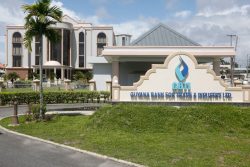At least two members of the Caribbean Community (CARICOM) have re-introduced visa requirements for Haitian nationals.
According to reports from various Caribbean News Sites, the Barbadian and Dominican Governments have re-introduced visa requirements for Haitian nationals entering their country. While the restriction applies to holders of ordinary passports they do not apply to those Haitian nationals who are holders of a diplomatic or official passport, who are business persons or those who are holders US, UK, Canadian or Schengen visas.
Barbados which allowed visa free movement of Haitian nationals last year was the first to announce a reversal of the measure.
The country’s ambassador to CARICOM, David Comissiong is quoted as lamenting in July the impact of the measure which reportedly saw scores of Haitians stranded on the island after being taken advantage of by human traffickers.
“No one in Haiti had really explained to them the principles of this free movement programme, and the vast majority of them were coming with this mistaken idea that they could simply come to Barbados to work and live, with many of them becoming stranded in Barbados,” he said adding that the island “derived no pleasure from having to move away from the full visa free regime, but we felt that we didn’t have a choice, and we communicated that to the Haitian Government, and they understand that Barbados’ heart is with them, but we were compelled to make the change.”
Comissiong explained that when Barbados removed the visa requirements, almost simultaneously, through the Barbados Tourism Authority, Panama’s COPA airlines started two flights a week out of Panama.
“Those flights out of Panama then became available to Haitians — Haitians coming from Haiti itself, and also Haitians coming from Chile, where there is a large Haitian Diaspora and those two weekly flights into Barbados came to be dominated by Haitian travellers,” he added stressing that the situation was becoming untenable, and a decision was made after extensive consultations with several stakeholders, including the Ministry of Foreign Affairs, the Immigration Department, the ministries of Tourism, and Home Affairs, airlines and the Grantley Adams Inter-national Airport.
He noted that the large number of stranded Haitians were beginning to receive a negative backlash from Barbadians and that was the last thing the government wanted.
“We did not want an initiative which was supposed to be a positive and constructive regional integration initiative descending into instability and chaos, and then generating a negative response from the Barbadian people,” he added.
Comissiong said that although Haitians were not coming “with any devious intention”, they could only work and live in Barbados if they qualified under the Caricom Skilled Nationals programme or the Right of Establishment programme.
Dominica’s announcement of their reversal came on September 12, days after Hurricane Dorian devastated parts of The Bahamas which has a large Haitian population.
A release issued by the Ministry of Justice, Immigration and National Security stated that government had, with immediate effect, re-introduced visa requirements for Haitian nationals entering Dominica.
The ministry further advised that people who intend to sponsor Haitian nationals “should be aware of the seriousness and obligations of this responsibility and should ensure that they educate themselves on the relevant laws and procedures involved.”
“Please note that all measures should be taken by members of the public to comply with these instructions,” the ministry cautioned.
As a member of the Caribbean Single Market and Economy (CSME) Haiti’s nationals are entitled to visa free travel to any member state but stigma and stereotypes have in many cases meant that they have been unable to access this provision.
Guyana in 2019 adjusted Schedule II of the Immigration Act, Cap. 14:02, to include Haiti as a beneficiary to the CSME, which facilitates free movement within the Region and automatic entry and stay of six months in CARICOM countries.
Since that time more than 8,476 Haitians have arrived in Guyana and 1,170 departed the country while 48 were refused leave to enter on landing.
The Ministry of Citizen-ship has also stated that 6,925 of these Migrants reported to Brazilian immigration officials after crossing the border, which separates the two countries.
Stabroek News had reported the ministry as saying that the migrants were “coming legally and going out legally at Lethem” but Guyana’s official figures suggest that there was no record of the Haitians leaving via Lethem legally or that these records have not yet been reconciled.
Opposition Leader Bharrat Jagdeo has continued to claim without evidence that Haitians and other foreigners are being provided with fake documents to facilitate their registration during the current House-to-House process.
This claim has been described by President David Granger as incredible.
“Opposition leaders tend to oppose but there is no credibility to the claim,” he said during a press briefing on August 8.
Minister of Citizenship Winston Felix has repeatedly stressed that the police have found no evidence of smuggling of Haitians and he called recent reportage on this matter “xenophobic”.
“This position resembles xenophobia and is even practised by certain people in power. I cannot see why (members of) a CARICOM state, which has now gotten CSME status can be so vilified for passing through Guyana. They are just passing through and yet they are attracting all the negative thoughts and actions of people who are seeking power. We have 8,476 Haitians arriving in Guyana but for example, we have 11,119 Trinidadians also arriving for the same period and no one is making a noise about that but everyone is making noise about the Haitians who simply use Guyana as a point of transit to get to their diaspora in Colombia, Cayenne (French Guiana) or Panama,” he said in August.
The movement of Haitians through Guyana appeared to have elements of people smuggling and possibly human trafficking.










